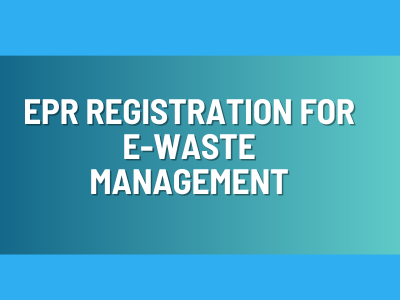
EPR Registration for E-Waste Management in India
Extended Producer Responsibility (EPR) Registration is a mandatory compliance requirement under the E-Waste (Management) Rules, 2022, notified by the Central Pollution Control Board (CPCB). It ensures that producers, importers, and brand owners take full responsibility for the collection, recycling, and safe disposal of electronic waste generated from their products.
EPR registration promotes sustainable waste management practices and helps minimize the environmental impact of discarded electronic items such as mobile phones, computers, televisions, and other electronic appliances.
Who Needs EPR Registration?
EPR Registration is mandatory for the following entities involved in the production, sale, or import of electronic and electrical equipment (EEE):
- Manufacturers of electrical and electronic goods.
- Importers bringing EEE products into India.
- Brand Owners selling products under their own brand.
- Producers who introduce electronic products into the Indian market.
Purpose of EPR Registration
The objective of EPR is to ensure that every producer or importer contributes to the safe collection and recycling of e-waste generated from their products after use. It promotes:
- Environmentally sound management of e-waste.
- Reduction in landfill pollution and hazardous waste.
- Circular economy through recycling and reuse.
- Accountability of producers towards end-of-life product management.
Documents Required for EPR Registration
To obtain EPR registration from CPCB, the applicant must submit the following documents:
- Company Incorporation Certificate (CIN) or MSME certificate.
- GST Registration Certificate.
- IEC Certificate (for importers).
- Authorized Signatory ID proof.
- Product details with brand name and category as per E-Waste Rules.
- Details of proposed collection and recycling mechanism.
- Agreement or details of authorized recycler/dismantler.
- PAN card and contact details of the applicant.
EPR Registration Process
The EPR registration process is carried out online through the CPCB EPR portal:
-
Application Submission:
Submit the online application with all relevant documents and product details. -
Scrutiny by CPCB:
CPCB reviews the application for completeness and compliance with e-waste management norms. -
Approval of EPR Plan:
The producer must submit an EPR plan describing the collection and recycling process. -
Grant of EPR Certificate:
After successful verification, CPCB issues an EPR authorization, allowing the applicant to operate legally in India.
Validity and Renewal
- The EPR authorization is valid for 5 years from the date of issue.
- Renewal must be applied for 60 days before the expiry of the existing certificate.
Why Choose SS Globle EPR Registration?
At SS Global, we simplify the complex EPR registration process by providing expert guidance and end-to-end documentation support. Our experienced compliance team ensures that your business meets all CPCB norms efficiently and on time.
Our Services Include:
- Eligibility assessment and consultation.
- Preparation and submission of EPR application.
- Coordination with CPCB for approval.
- EPR plan drafting and documentation.
- Support for renewal and amendments.
With our professional assistance, you can focus on your core business while we take care of your environmental compliance needs.
Benefits of EPR Registration
- Legal authorization to manufacture, import, or sell EEE in India.
- Builds brand trust and environmental responsibility.
- Reduces environmental pollution caused by improper e-waste disposal.
- Contributes to India’s sustainable waste management goals.
Conclusion
EPR Registration is not just a legal obligation—it’s a commitment to a cleaner and greener future. Partner with SS Global to ensure full compliance with India’s e-waste management laws and demonstrate your dedication to environmental sustainability.
